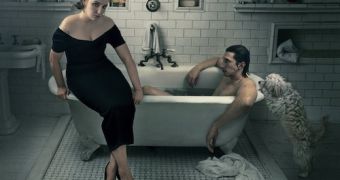After much speculation, Lena Dunham, star of HBO’s hit series “Girls,” has landed the much coveted cover of fashion bible Vogue. However, scrolling through the pages of the current issue, you might be surprised to see a slightly different Lena than the one you know from TV: a thinner, longer-limbed, more model-looking Lena.
Since the photos came out a couple of days ago, there’s been a lot of ruckus online about how Vogue is pretty much telling all women out there, whether of Lena’s body shape or not (and Lena herself), that they need to aspire to look more like a model.
They need to be slimmer and longer-limbed and have a smaller waistline and more sharp angles on the face. Then again, if they don’t (which Lena doesn’t), it can all be solved in Photoshop.
Outraged by the amount of digital manipulation visible in the photos in the spread, editors at Jezebel did the unthinkable and offered a $10,000 (€7,390) reward for the original pics, just to have something to compare the official portraits with.
Within hours, they had the photos. The image included at the end of this article is a close-up of the photo showing Dunham sitting on the edge of a bathtub in which a male model is taking a dip. It also shows the exact elements that were modified in it.
By looking at them, you can conclude which are the things that Lena needs to “improve” on – and they all spell “slim down.” Her jawline was sharpened, the neck was shaved down to make it longer and slimmer, the waist and hip were smoothed and made narrower.
“While Dunham has not been radically Photoshopped, it's clearer than ever what kind of woman Vogue finds Vogue-worthy: The taller, longer-limbed, svelter version of reality. Vogue is not interested in reality, of course. The photographs are meant to be a fantasy, art,” Jezebel writes.
“In the end, while Dunham's images were not drastically altered, it's important to remember how unforgiving the media is when it comes to images of women. Men are generally allowed to have pores and wrinkles; women are supposed to be ‘perfect’ — a state that does not exist,” adds the publication.
Vogue chief editor Anna Wintour is yet to address the controversy.


 14 DAY TRIAL //
14 DAY TRIAL //